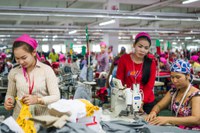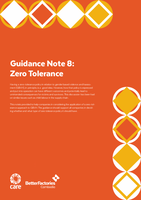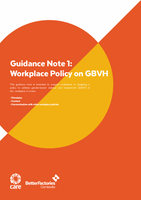
Better Factories Cambodia

How can we work together to ensure responsible digital wages payment?
How did the COVID-19 pandemic and better financial systems help many garment factories switch to paying their workers digitally instead of using cash? What are the advantages of this change for the factories, the workers, and the whole supply chain? In this video, you will hear from different stakeholders, including Textile, Apparel, Footwear & Travel Goods Association in Cambodia, trade unions, factories, the Ministry of Vocational Training, and the ILO-Better Factories Cambodia programme, about how digital wage payments improve efficiency, save time, enhance worker well-being, and support supply chain compliance.

Clear procedures with strong messages from leadership can help reduce harassment and make workers feel safer.

Guidance Note 8: Zero Tolerance
Having a zero-tolerance policy in relation to gender based violence and harassment (GBVH), in principle, is a good idea. However, how that policy is expressed and put into operation can have different outcomes and potentially lead to unintended consequences for victims and survivors. This discussion has been had on similar issues such as child labour in the supply chain. This note is provided to help companies in considering the application of a zero-tolerance approach to GBVH. The guidance should support all companies in deciding whether and what type of zero tolerance policy it should have.

Guidance Note 1: Workplace Policy on Gender-Based Violence and Harassment
This guidance note is intended to support workplaces in designing a policy to address gender-based violence and harassment (GBVH) in the workplace. It covers: • Principles • Content • Harmonisation with other workplace policies
